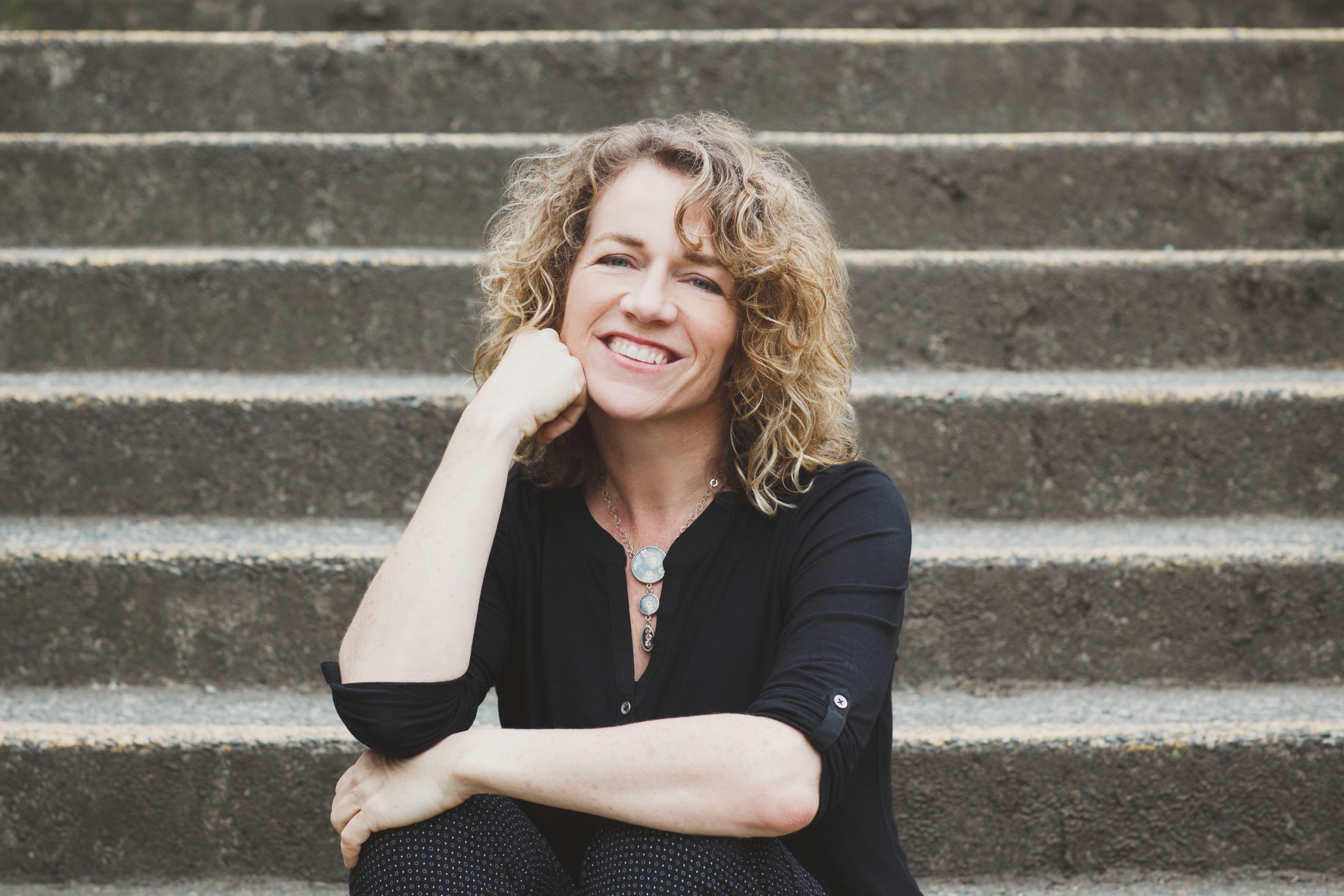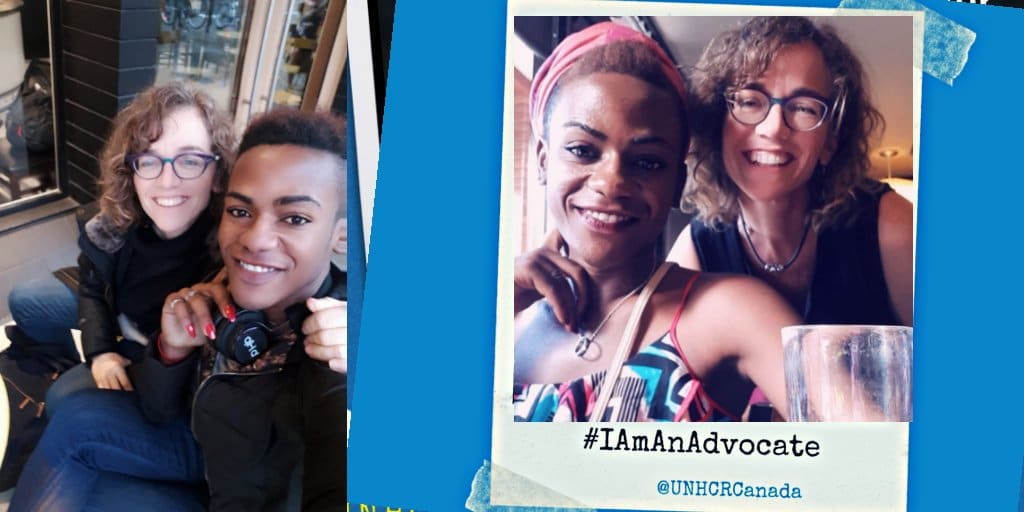
© Courtesy of Robin Stevenson
When Canadian children’s author Robin Stevenson saw the headlines about the Syrian refugee crisis in 2015, she knew she had to help.
The Vancouver Island-based writer, mother and refugee advocate and resettlement sponsor explains why it is so important for her to say “#IAmAnAdvocate” for refugees.
When did you first hear about the refugee emergency and what inspired you to act and advocate for refugees?
Back in 2015, when the Syrian refugee crisis was in the headlines, I—like so many others—felt that I needed to take action in some way. First, I started a fundraising initiative with a friend, encouraging Canadian children’s authors and publishers to donate to Doctors Without Borders—but I wanted to do more., So, that fall, I joined a group through Canada’s Private Sponsorship of Refugees program. We sponsored a Syrian family—a young couple with four small children, the littlest one just a baby. They arrived in Canada in the summer of 2016. They now own and run a successful business in Victoria, a Middle Eastern grocery store called Damascus Market.
How have you become a refugee advocate over the years?
After sponsoring a Syrian family, I started four more sponsorship groups. In 2017, we welcomed a couple from a country in the Middle East, and in 2019, we welcomed three young women from a country in sub-Saharan Africa. My most recent group has applied to sponsor a fourth young woman, and her case is currently being processed.
The role of the sponsorship group includes financial support, so we have done a lot of fundraising! We have also found and furnished apartments, met people at the airport, helped the sponsored newcomers get bank accounts and phones, driven them to doctor and dentist appointments, supported them in accessing English classes and looking for jobs, shown them around town, shopped together, gone for hikes, cooked meals, and generally just done our best to help them feel at home in their new community.
I have a particular interest in the challenges facing refugees from the LGBTQ+ community—they are a highly vulnerable group and often continue to face danger and violence in refugee camps and in countries of asylum. I am a member of the Rainbow Coalition for Refuge (RC4R), a network of groups across Canada that support and advocate for LGBTQ+ refugees and work to create safer pathways to resettlement in Canada. I also wrote a book to help raise both awareness and funds for refugees: It is called Ghost’s Journey: A Refugee Story, and it is based on the true story of a gay couple who resettled in Canada after fleeing persecution in Indonesia. I have been very happy to see it being used in schools to help start important discussions about human rights, the global LGBTQ+ community, and refugee issues.
At the heart of the #IWasARefugee campaign is the idea that being a refugee is a state of existence – it isn’t someone’s entire identity or being. How have you seen former refugees in your life succeed and thrive once they are resettled in a country like Canada, where they are safe from the violence and persecution, they may have faced in their home country?
It has been wonderful to see people be able to move forward in their lives, often after years spent in very difficult circumstances in their own countries, and still more years living as refugees while waiting to be resettled. The former refugees I know are working, raising their children, and going to school themselves. They are running businesses, studying to become health care aides or licensed practical nurses or graphic designers. They are working for the provincial government, for local companies, in grocery stores, for settlement agencies, as dietary aides, caring for seniors, and even helping with COVID-19 testing. Many are also supporting family members and friends who are still waiting to be resettled, and many are speaking up publicly to help raise awareness about the challenges faced by refugees and the importance of refugee resettlement. All of them are giving back to this community and making it stronger in so many ways.
[Many of my friends] who were once refugees have taught me a great deal, been incredibly kind and generous, and enriched my life immeasurably. I am very grateful to have them in my life and honored to call them friends.

Robin and her friend Seagirl Abuson. They met online in 2018: she had fled persecution in Uganda while still a teen, and was living as a refugee in Kenya. As a trans woman, she faced ongoing danger and violence in Kenya. © Courtesy of Robin Stevenson
As a refugee advocate, what support, community and help do you think is integral for those who are resettling in Canada?
Settlement services make a huge difference! In my community, I have been so impressed with the support offered by the InterCultural Association of Greater Victoria. From orientation sessions, to English classes, to youth programs, and employment skills training and counselling, they have helped the newcomers I know to learn, gain confidence, make friends, find work, and to thrive in their new home.
It is also essential the whole community be supportive. Across all sectors, from education to health care to financial institutions to employment, we need to make sure that newcomers are welcomed, that services are appropriate and accessible, that language and cultural barriers are removed, and that people are genuinely supported and helped to feel like they belong in their new home.
Canada has a strong history of supporting refugees. What is the importance of bringing refugees issues to the forefront of the conversation, in Canada and worldwide?
It is so important that all Canadians recognize our international obligations to refugee settlement. It is also vital that people understand that as well as being about humanitarian concerns and justice for refugees, it is also mutually beneficial. We need to work to ensure that people are aware of how much refugees contribute and to encourage more people to actively support newcomers resettling here—for example, hiring former refugees, providing affordable housing for a newcomer, volunteering for a settlement agency, donating to refugee organizations, or joining a sponsorship group. And I would love to see more people speaking up to challenge xenophobia, racism, and anti-immigrant rhetoric—and correcting the misinformation that often fuels these—whenever they encounter it. When we are fortunate enough to live in a country like Canada—a peaceful and relatively safe country, where your basic human rights are protected by law—the least we can do is try to open the door a little wider for those who are seeking safety.
Add your name to the #IAmAnAdvocate pledge and join the UNHCR in sending send a clear message: everyone counts, and there is no place for xenophobia and racism in our world.


